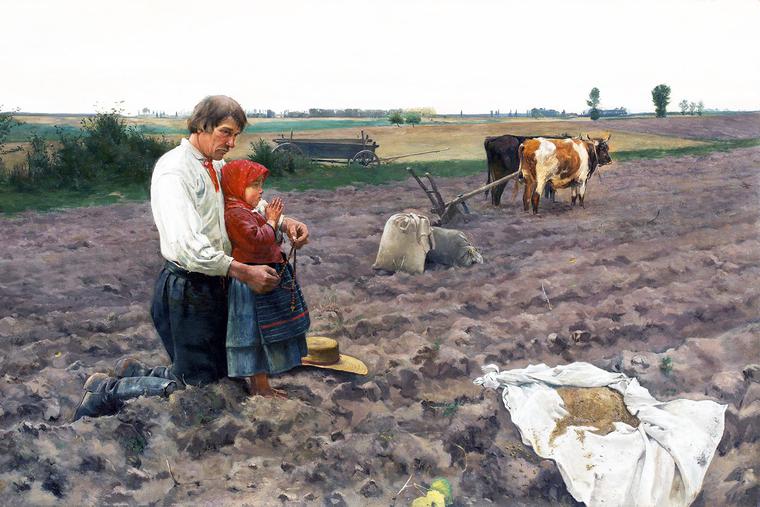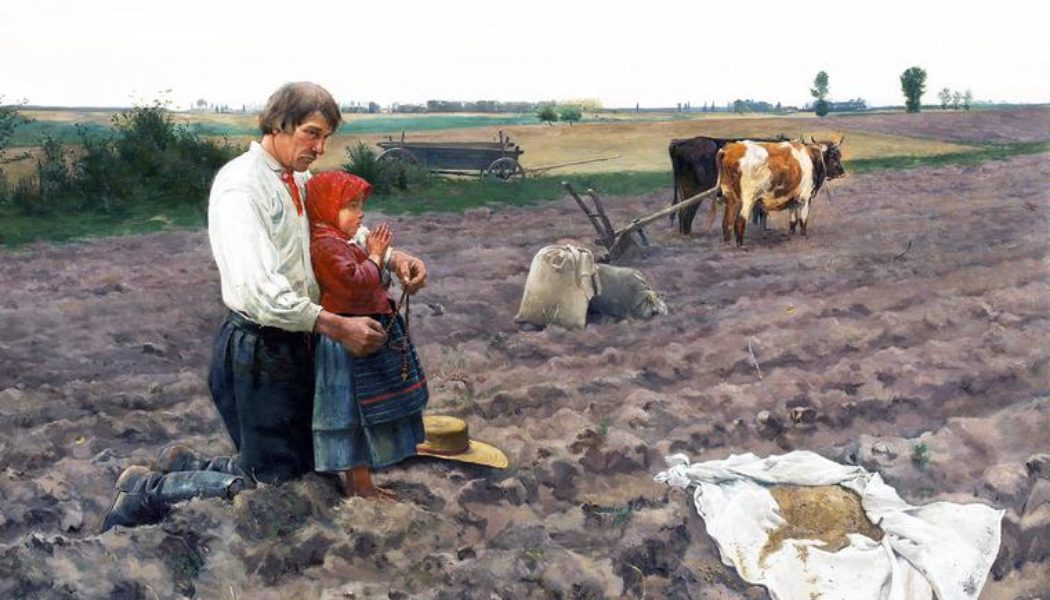
A consistent charge against the various iterations of “back-to-the-land-ism” is that wannabe farmers are fleeing society at a time when society needs Christians more than ever.
When I announced a move from Denver back to my home state of North Carolina in order to start a farm, a friend quipped, “No missionary ever declared he was going to the country!” Other than his historical ignorance (St. Louis de Montfort, anyone?), and perhaps forgetting that rural people also have souls, I did take to heart his point. By design, God has Christians in the world. We are communal and social creatures. Was I doing something inhuman by “fleeing to the fields,” as the famous distributist book by that name put it?
I propose that there is a paradox here that is missed by both boosters and knockers of moving away from cities and suburbs to homesteads and farms. Far from leaving people behind for the land, agrarian living — in its authentic forms — cultivates a form of communal life that has a unique character and quality that is very likely more engaged with local society than less. The other paradox is that whereas we struggle deeply to not see people in a utilitarian way, it is precisely when we find the “utility” of community that it is actually strengthened and made real.
Finding Family
First, let’s consider actual motives. At least when it comes to young families — by which I mean still with young children — the overwhelming reason for attempting to farm or homestead is for the sake of being with the family. Rarely are they really “running” from something, or even prepping for disaster. More often they’re just seeking a way of life generally more integrated and together through a shared work on the land. Many fathers, perhaps with a touch of simplistic idealism, think it would be better to work directly for sustenance by growing food than having the intermediary step of making money to buy food. They also just want to have some work with their family instead of far from it.
There’s reason to think making the home a functional place will realign a father within his household.
In The Quest for Community, Robert Nisbet observes that after industrialization the family “progressed from institution to companionship,” meaning their family unit was held together by their relationship to one another and not because of the practical needs of the family as a whole. Today, people live together as families as forms of emotional support (“I believe in you!”) and not mutual dependency (“Grandpa’s gonna help you get that corn planted today before the rain”). The result, according to Nisbet, is that when the home loses a functional bond like craft or even physical care (of the elderly, for example), it loses “cultural significance [as an] indispensable institution.” He makes the persuasive case that people don’t want to live together to be together, but to do something together.
For many, the idea of an agrarian (land-based and agricultural) life offers an alternative to the conflicts between work, home and recreation in modern life. Work and home-based economics makes the family indispensable again.
The logic of the idea holds, as we see in the consistent proposals of back-to-the-land-ism that bubble up regularly with strength of thought that is proven by historical reality. But many observers note that the families who make the jump don’t hold. They flee back to the city.
For example, the famous clarion caller to faming life, Joel Salatin, is a big fan of an agricultural-based society. Yet, he’s observed that newly established homesteads and farms rarely make it past four or five years. In my observation over the last decade in the country, I would say it is closer to two years.
There are a variety of reasons worth exploring for this apparent failure, from bushytailed romanticism to the disjointed difficulty in merging remote work on the screen and cultivation of the soil, which is a means that many use to move to the country. Though there is truth clearly observable in these reasons that back-to-the-land-ism fails, I think the more fundamental and crippling difficulty is the lack of communal life and culture when one moves to the land. Figuring it all out alone is very difficult, and lacking affirming and helpful supports can also stall or kill inexperienced hopes. As the family needs functionality and companionship to flourish, so too our life as social creatures benefit from and needs mutual dependency that is both securing and socially edifying. “Out here” community is more than companionship, and we need it on a whole different level.
Looking for Others
Perhaps it is my own awakening, but it seems that for many younger families desiring a move to the land, they have more fully integrated and acknowledge the need for culture and community in their familial plans to farm or homestead. People are more aware and willing to reestablish these kinds of bonds, recognizing that if they are to “make it” they really can’t live from YouTube videos alone (or at all). When we host our homesteading workshops at St. Joseph’s Farm, for example, the surveys of those who come reveal that learning how to find and cultivate community is sought just as much as the practical skills of homesteading.
It seems that as people see the home’s ability to find organic integration more easily in an agrarian life, so too a much longed-for form of community might also flourish more easily around homesteading. We’re learning how intertwined these needs are. People don’t want to escape others. They want to find them. Again, leaning on my own observation, it seems that those that operate within a broader network of members find more staying power in their homestead.
A reason for this might be that these bonds are not unlike the ones Nisbet said made the family so strong in times past. Without economic and practical bonds, all our social interactions must be intentional — à la “intentional communities.” Perhaps we cringe at that idea, but as the family must fight to keep its cohesiveness in the face of societal dismissal, so too communities do not spring up organically in the soil of today’s busy and distracted life. Intentionality is necessary to life if you see community as necessary. It’s just the bonds offered in rural and agricultural life tend to develop differently, along lines and veins of life’s practical needs.
This is the great paradox of “fleeing to the fields.” To make it work you actually do not increasingly see yourself as self-sustaining and isolated, but dependent and cooperative. My small dairy operates in a local but complex dependency for feed, customers and the guy that owns the bull. On the one hand, I am more self-sustaining than ever in food and drink, but unlike previous places where I have lived, those around me are not just neighbors that I should be friendly to from decency (as fine as that is), but also because I need them. I am grateful for them in ways born from their provisional care and connection to my home’s needs. This does not reduce our relationship to utilitarianism, as some might charge, because a world of planting, bartering and tending simply doesn’t use up relationships in that way, as a life of buying and selling might. We don’t “network” out here in case there’s some unseen relational leverage we might lay on the table at some point. We simply recognize a need for one another that gives birth to organic neighborliness.
Our Tractor
In Grapes of Wrath, John Steinbeck describes the potential power of men to combat the leviathan of large corporations by changing “my tractor to our tractor.” It seems that the determination to live on the land must be matched with a determination to live with and for other people, to have community that is liberated from the potential strangeness of intentionality because it is born organically from dependency. This is harder than it seems — we rarely take stock at how modernism has isolated us from admitting or living mutual dependency with justice and charity. Yet, if one is seeking to make a change toward an agrarian life, the willingness and openness to living alongside other families seems to be a necessary component on whether or not you’re going to make it. Not only does communal life help confirm and cultivate the way of life itself, but it also makes it more possible on a practical level.
One thing that can be said, however, is that those that want to flee to the fields are not running away from communities. They’re looking for them.
Join Our Telegram Group : Salvation & Prosperity








